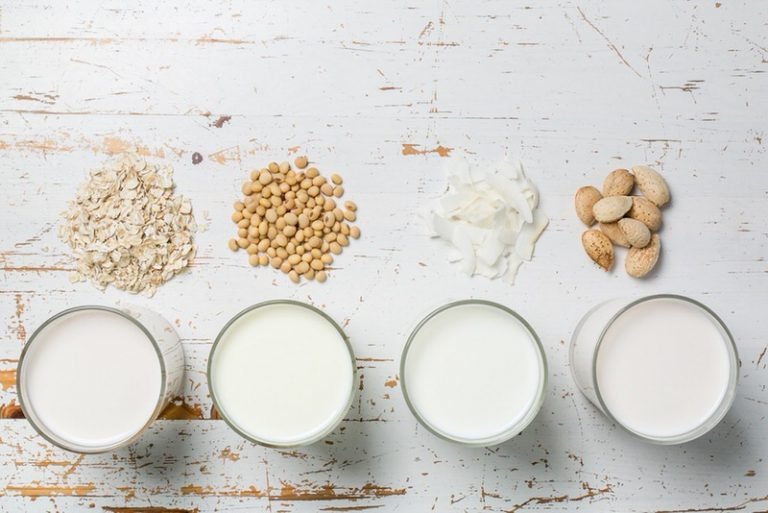Plant milks are excellent alternatives to cow’s milk, thanks to their high content of essential nutrients, ideal for lactose intolerant. We discover everything you need to know if it is the first time you try them.

It is usual that, when a person consumes cow’s milk, in a short time they tend to suffer symptoms such as poor digestion, flatulence and an upset stomach. This is called lactose intolerance, and the reality is that many people are originally unaware that they have this disorder.
This intolerance appears when there is a lactase deficit during the process of absorption of lactose in the small intestine, since it passes to the large intestine without decomposing, beginning to ferment.
All this means that the person is not able to digest lactose correctly, which leads to gas and heartburn, among other related digestive and stomach disorders.
But this does not mean that you cannot enjoy the full flavor and benefits of milk. Options exist in the market such as milk without lactose. Although it is also useful to opt for other alternatives, such as vegetable milks.
How many types of vegetable drinks are there?
- Soy milk: soy milk is undoubtedly one of the best known alternatives to cow’s milk. It is extremely rich in B vitamins and proteins. It helps reduce cholesterol and triglycerides, as well as being a good preventive against cardiovascular diseases.
- Oat milk: it is one of the most nutritionally complete options. It is rich in carbohydrates, B vitamins, vitamin E and D, as well as minerals (potassium, iron, calcium, phosphorus, magnesium, copper and zinc) and carotenes.
- Almond milk: it is a vegetable drink that is made from almonds, nuts that provide very important heart-healthy benefits. It is rich in minerals, in addition to helping lower cholesterol and prevent osteoporosis.
- Sunflower milk: it is a vegetable drink rich in vegetable fats, minerals such as magnesium and phosphorus, and it also promotes good brain function.
- Pumpkin Seed Milk: Pumpkin seeds provide linoleic and linolenic fatty acids, minerals (such as zinc, magnesium, iron, and phosphorus), and vitamins. Helps maintain a good cardiovascular system.
- Rice milk: it is a really energetic drink due to its high carbohydrate content. In addition, it helps improve intestinal transit.
- Sesame milk: Sesame seeds are especially rich in minerals (such as zinc, iron, copper, calcium, magnesium, phosphorus, and chromium), and they also provide protein and unsaturated fats such as omega 6 and omega 9 fatty acids.
Nutritional information for plant-based milks
Depending on the type of vegetable milk that is going to be consumed, they will provide different nutritional values.
To give just one simple example, in the case of soy milk we are faced with a vegetable drink that is especially rich in protein, while oat milk stands out for its high content of carbohydrates.
These vegetable drinks stand out in turn for their high content of essential nutrients, such as vitamins and minerals essential for the proper functioning of our body.
Therefore, there is no doubt that we are faced with excellent alternatives to cow’s milk, ideal for a healthy and balanced diet.
Why can they be a good alternative to cow’s milk?
If you consider the possibility of looking for alternatives or substitutes to cow’s milk, it is quite likely that it is because it does not suit you, because you have stopped liking it, because you have considered following a vegan or vegetarian diet, or because you think you may suffer lactose intolerance.
The truth is that it is a type of intolerance whose incidence has increased surprisingly in recent years, probably because we have begun to be more aware of the symptoms that tend to appear when we suffer from it, and because also the means to diagnosing it have become more accessible.
Be that as it may, the truth is that vegetable drinks are interesting options if you are looking to replace cow’s milk, but we must go in parts.
Milk -and its derived products- stands out for being a tremendously complete food group, thanks to its contribution in proteins of high biological value, vitamins and minerals as fundamental as calcium.
Therefore, if we give up milk we are in turn giving up one of the most complete foods that exist in our diet. However, that does not mean that it is an essential food (specifically, a drink). In fact, many nutritionists agree that, in reality, we should only drink milk in childhood.
However, vegetable drinks offer interesting advantages over cow’s milk. For example, they stand out for having a better lipid profile, having a much lower amount of saturated fatty acids, while their contribution in unsaturated fatty acids is higher.
Thus, for example, the isoflavones present in soy drink help prevent cardiovascular diseases, and can be very interesting for women during menopause.
How to choose a healthier plant drink: two things to look out for:
If you plan to substitute milk for any other vegetable drink, and include it in your daily diet, you must take into account two fundamental elements: whether or not they are enriched with calcium and vitamin D, and the amount of added sugars.
It is very common to find vegetable drinks to which sugars have been added (either in the form of sugar, brown sugar, brown whole cane sugar, panela or stevia), so that a natural drink that apparently tends to be healthy , it becomes a liquid with a high sugar content, so it would not be so suitable. In this sense, it is best to discard any vegetable drink that provides more than 5 grams of sugar per 100 ml.
We must also look at whether vegetable drinks have been enriched with calcium and vitamin D. In this way we will offset the risk of losing these nutrients when we eliminate milk of animal origin from our diet. Thus, the most appropriate thing is to opt for drinks that contain at least 120 mg per 100 ml in the form of calcium citrate.































